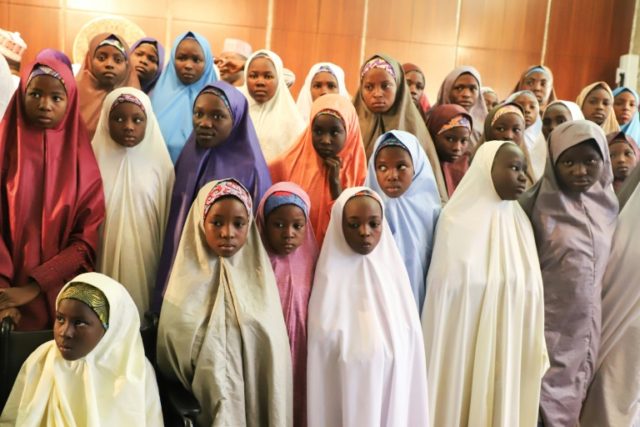Nigerian officials failed to confirm or deny news this week that nearly 100 girls had died in captivity as the nation observed four years since Boko Haram abducted over 200 girls from the northeastern village of Chibok.
While Abuja has managed to negotiate for the release of dozens of the girls originally kidnapped, an estimated 113 remain under the Islamic State affiliate’s control. A Nigerian journalist known to have ties to leaders within Boko Haram reported this weekend that most of the 113 are dead.
Boko Haram kidnapped 276 girls from a secondary school in Chibok on April 14, 2014, while they were taking a physics exam. 57 girls escaped in the immediate aftermath of the abduction, many injuring themselves significantly by jumping off of the trucks they had been packed into. The other 219 remained in custody for the long term, with some exceptions. Last May, Boko Haram agreed to the release of an estimated 82 of the girls in exchange for the liberation of key leaders within the group. The Nigerian government subsequently readjusted their estimate of the number of girls left in captivity to 113.
On Saturday, Nigerian newspaper Vanguard reports, journalist Ahmad Salkida estimated that 15 girls remained alive, while another 98 had been killed in captivity in the Sambisa forest, either by their captors or in Nigerian government airstrikes on Boko Haram targets.
“Many of the girls have died as a result of crossfire and bombardments by security forces that no doubt were intent on rescuing them,” Salkida tweeted.
On Tuesday, Salkida reported that Boko Haram sources had told him that twice the number of girls remained alive. In addition to the 15 confirmed alive, another 15 remain in their custody from the original group abducted from a secondary school in Chibok on April 14, 2014.
4/ A leading member of the Jama'atu Ahlis-Sunna Lidda'Awati Wal-Jihad or BH has now clarified the earlier information about 15 girls. Indeed, the 15 #Chibokgirls are available, but known to a particular cell that spoke to me emphatically days leading to the 4th anniversary.
— Ahmad Salkida (@A_Salkida) April 17, 2018
5/ However, two other cells within the larger group has brought additional information, clarifying the earlier information, that there is another 10 girls available to another cell. Outside of the 15 and 10, another 5 amongst the girls are also alive as at early hours of today.
— Ahmad Salkida (@A_Salkida) April 17, 2018
Five of the second group of 15, Salkida says, have been so thoroughly indoctrinated that they have requested to Boko Haram leaders that they not be part of any negotiations for release with the Nigerian government, as they do not want to return to life outside of the terrorist group.
Nigeria has struggled even with reintegrating girls into society who do seem to wish to return to their families. Many of the girls are being kept in refugee camps – some with children born in captivity to the terrorists they were “married” off to – and un-indoctrinated out of the repressive jihadist ideology they were forced to consume. Yet the girls are not safe even when placed in refugee camps; a year ago, Nigeria accidentally conducted an airstrike on one of these camps and killed 100 Boko Haram victims, instead of targeting a stronghold held by the terrorists.
Vanguard notes that the Nigerian government has dismissed the claim and suggested that, according to their sources, all the remaining Chibok girls are alive.
“Following the numerous press enquiries on the information contained in the series of tweets by Mr Ahmed Salkida, we wish to reiterate that the information is not known to the officials of this administration either from the captors of the Chibok girls or the international intercessors who are working with us,” Senior Special Assistant to President Muhammadu Buhari Garba Shehu told reporters on Monday. “We wish to confirm that Mr Salkida is not involved, on behalf of the Nigerian government in the processes leading to the release of the over 100 Chibok Girls that have returned.”
“The remaining Chibok Girls are there and we are not relenting on getting their release,” Shehu insisted, adding that Salkida had not approached the government with the information he received from his Boko Haram source.
Some relatives of the remaining missing girls have demanded that the government force Boko Haram to deliver proof of life for the girls that Abuja insists are still alive.
“This claim has added to the grief of parents. The government should act fast. The longer it takes to resolve this issue, the more the future of these girls is destroyed,” Ayuba Alamson Chibok, a local activist and relative of one of the victims, told Agence-France Presse (AFP). He noted that the information relatives have received through back channels from Boko Haram confirms that “some girls were killed in [a] military strike on the camp they were being held.”
Boko Haram most recently released a proof of life video of the Chibok girls in January. In the video, the girls deny wanting to go home.
“By the grace of Allah, we will not return to you,” one girl says.
The continued hostage status of the girls remains a blight on the record of Buhari, who became president in 2015 after running a campaign vowing to eradicate the terrorist group and condemning predecessor Goodluck Jonathan for not fighting back hard enough against Boko Haram. In December 2015, Buhari announced that Nigeria had “won the war” against the group,” a wildly premature statement that has continued to haunt him, as Buhari continues to insist Boko Haram no longer poses a threat to the country. Shortly before the group released the January proof of life video for the Chibok girls, Buhari had told local media, “we have since beaten Boko Haram” yet again.

COMMENTS
Please let us know if you're having issues with commenting.